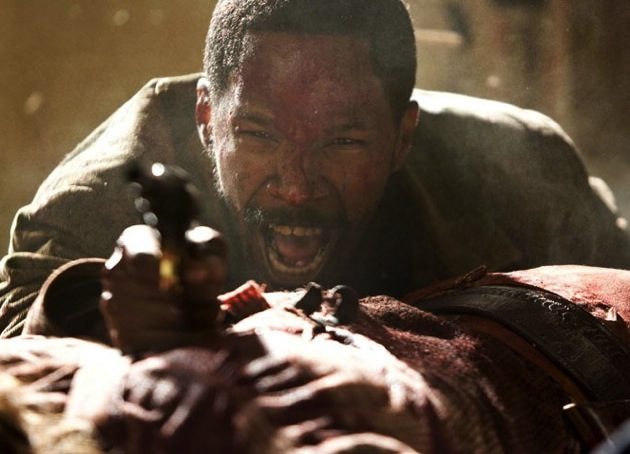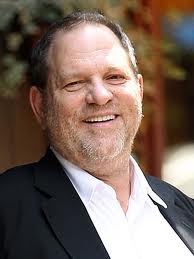The Tarantino Tarantella: Harvey Weinstein Changes Tune On Movie Violence

What a difference an Oscar-nominated picture can make. Last July, in the wake of the Aurora, Colorado movie-theater shootings, Harvey Weinstein generated headlines, and some snickering in the film industry, when, in an interview with the Huffington Post, he called for a filmmaker summit on movie violence. But now that he's got Quentin Tarantino's bloody, gunplay riddled Django Unchained movie vying for a Best Picture Oscar, his perspective has changed. In a recent interview with Deadline, Weinstein, who's never been content to ride in the back seat, said he has to be "a follower, not a leader" on the issue.
Here's an excerpt of Weinstein's HuffPo interview, which posted just days after the Aurora shooting:
Weinstein, who is set co-host a fundraiser for Barack Obama in Greenwich, CT, on August 6, declined to criticize the president directly for shying away from a fight over gun control. "I don’t think he’s timid," he said. "I think he’s got deep personal beliefs. I don’t have to agree with everything a candidate does to support him." And, unlike many in Hollywood, he was willing to acknowledge that violence in movies may exert some influence over individuals like James Holmes, who killed 12 people after opening fire at a midnight screening of "The Dark Knight Rises" last Friday.
"It’s a question that I wrestle with all the time," said Weinstein, who has produced all of director Quentin Tarantino’s blood-spattered films, including the upcoming slave-era revenge fantasy "Django Unchained." "I’ve been involved with violent movies, and then I’ve also said at a certain point, ‘I can’t take it anymore. Please cut it.’ You know, you’ve got to respect the filmmaker, and it’s a really tough issue. My heart goes out to those kids and those families."
Weinstein said he hoped that members of the Hollywood community would take this opportunity to have an honest conversation about how on-screen violence influences real-world events. "I think, as filmmakers, we should sit down – the Marty Scorseses, the Quentin Tarantinos, and hopefully all of us who deal in violence in movies – and discuss our role in that."
Six months and another mass shooting later, here's what Weinstein told Deadline's Mike Fleming in an interview that took place at the Sundance Film Festival:
DEADLINE: What was your reaction when the NRA blamed the Newtown, Connecticut massacre on the depiction of violence in Hollywood films and video games, instead of the easy access to legal semi-automatic weapons like the one used in that elementary school shooting spree?
WEINSTEIN: Those are my three most un-favorite letters, when you put them in that order. NRA.
DEADLINE: So you reject the premise there is a cause and effect between violence and entertainment, and real violence?
WEINSTEIN: I’m not as educated as I should be here; I want to know more. But I certainly reject that premise.
DEADLINE: Could Hollywood do a better job of reigning in the depiction of violence and have stronger moral ground to stand on? Am I giving you indigestion right now?
WEINSTEIN: No not at all, I’m just trying to think it through. Mike, I don’t have the answers to these questions. I really don’t. They’re so complicated, you need people with better facts and intelligence. In this situation I have to be a follower, not a leader.
 Perhaps Tarantino, who has been refreshingly testy on the subject of whether Django Unchained and his other violent movies have contributed to societal violence, has swayed The Weinstein Company co-chairman to his way of thinking: As the director told NPR's Terry Gross in early January, there was no connection. The real issues, he said are "gun control and mental health."
Perhaps Tarantino, who has been refreshingly testy on the subject of whether Django Unchained and his other violent movies have contributed to societal violence, has swayed The Weinstein Company co-chairman to his way of thinking: As the director told NPR's Terry Gross in early January, there was no connection. The real issues, he said are "gun control and mental health."
But given Weinstein's unparalleled talent at bringing home awards and Oscars for his movies, I suspect the movie mogul is just holding his tongue for the sake of smart politics. It wouldn't help Tarantino's Oscar chances for the executive producer and distributor of Django Unchained to be reiterating his call for a filmmaker summit on movie violence right now. By the way, Weinstein would never admit this, but his comments in July struck me as a different kind of political strategy: an avid Obama supporter's attempt — in the crucial crunch time before the November election — to draw some attention away from the president for, as HuffPo put it, "shying away from a fight over gun control" in the wake of the Aurora tragedy.
Now that Obama has been reelected, Weinstein can turn his full attention to the politics of winning Oscars.
I've asked Weinstein's spokeswoman if he'd like to comment on this story and will update this post if either responds.
More Movieline coverage on 'Django Unchained' and Movie Violence:
- Why Quentin Tarantino Needs to Stop Deflecting The Violence Question
- Quentin Tarantino 'Annoyed' By NPR Question About Sandy Hook
Follow Frank DiGiacomo on Twitter.
Follow Movieline on Twitter.
